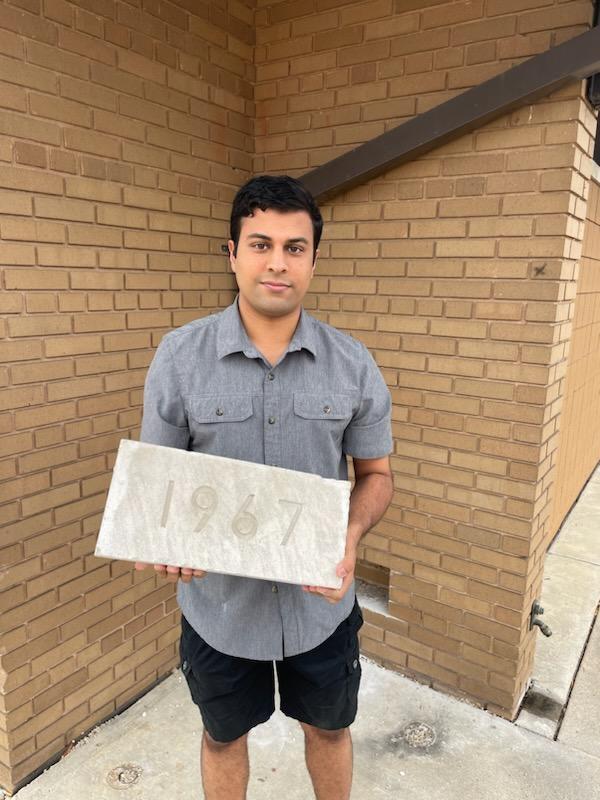Lucas Almas is close to earning two master’s degrees online. An M.A. in History and M.L.I.S. in Library and Information Science are the perfect pairing for this lover of museums and history. Even before graduation, Almas was granted temporary certification as Director of the Markesan Public Library in Markesan, Wisconsin—a professional position usually reserved for those with master’s degrees. His colleagues couldn’t be more supportive of his educational goals, he says. “The board wants me to succeed. They and the staff kick me out the door when they know I have to do my homework.”
Quick progress to two complementary degrees
At the rate he’s going, in December 2024, he’ll earn his degrees, after two years of study, or the equivalent of one year per program. “My two degrees are complementary. My history focus is digital and public history. My library science focus is digital curation, and together they open even more doors in the museum and library fields.”
Why IU Online? With a B.A. in History and experience at the US Naval Academy Museum and the College Park (MD) Aviation Museum, Almas wanted to stay in the museum field. A mentor advised Almas to add an M.L.I.S. to his M.A. in History from IU Online to expand his job opportunities. She recommended the IU Indianapolis Luddy School’s Master of Library and Information Science. So Almas enrolled and has already seen the benefits.
IU’s special effort made it possible
Almas lives and works in Wisconsin. But Luddy’s Library and Information Science program is offered in person. To enable Almas to attend remotely, the department head and program staff adjusted an online version of the program especially for him.
Practical content enhances career
Almas’s library staff, who average 50 and above, see their world changing around them. They rely on Almas to help lead the evolution today’s library patrons want.
“Our job as librarians is to help preserve information and make it findable so people can use it. What I learn in my library science program I take to work on Monday. My digital curation specialty is illuminating lots of ways to make things findable. The premise of my class on information architecture for the web is how to make web sites easier to navigate. It’s all about user experience. People just want to look at a screen and know where to go. Sometimes it’s where to put a button, or how to organize a page. Navigation must work for people. Users say, ‘Don’t make me think.’”
Engaged instructors, learning options empower online learning
“Engaged instructors empower students. I can easily and quickly reach professors in both programs through email and Canvas. Some instructors interact with us every week and post videos of announcements and of themselves recapping the week’s work.
“As well, instructors who offer a variety of learning modes reach more people. I learn best through reading and listening. Others learn best through video lectures.
“In history, I have the freedom to pursue my specific research interest. That’s empowering. I’m pursuing a theme I’ve followed since undergraduate days: Antarctic exploration. I really appreciate the power of choice.”
Online learning makes you think
“My online programs emphasize analytical thinking. Memorization is no longer useful to historians. You can look up anything online. It’s more important to know how to analyze and synthesize information and ideas from multiple sources.”
Virtual meetings expand learning, build connections
“My history program offers a lot of virtual synchronous meetings where students and professors engage. Fellow classmates are teachers or paraprofessionals, some working for historical societies. Their work in the field brings a huge wealth of knowledge to class discussions. The variety of takes on the same ideas vastly augments student learning.
“The library science program uses the Discord social networking app where users can chat in real time and build communities around common interests, like research and homework assignments. My peers are all working librarians looking to upgrade their careers. We share ideas about putting new information to work in our professions.”
The library of the future
“There’s a push to make libraries a third space. If home is our leisure space, and work is our productive space, libraries can offer a third option. They mix the relaxed atmosphere of home, a place for friends to gather, and assets and resources for learning and discovery.”
Advice for students
“I say keep organized! My saving grace is my whiteboard. There, I keep all my to-dos so I can visualize each day’s tasks. You need self-discipline to get something done every day. Another bit of advice: Don’t distract yourself with all the other fun things on your computer. Stay focused.”


